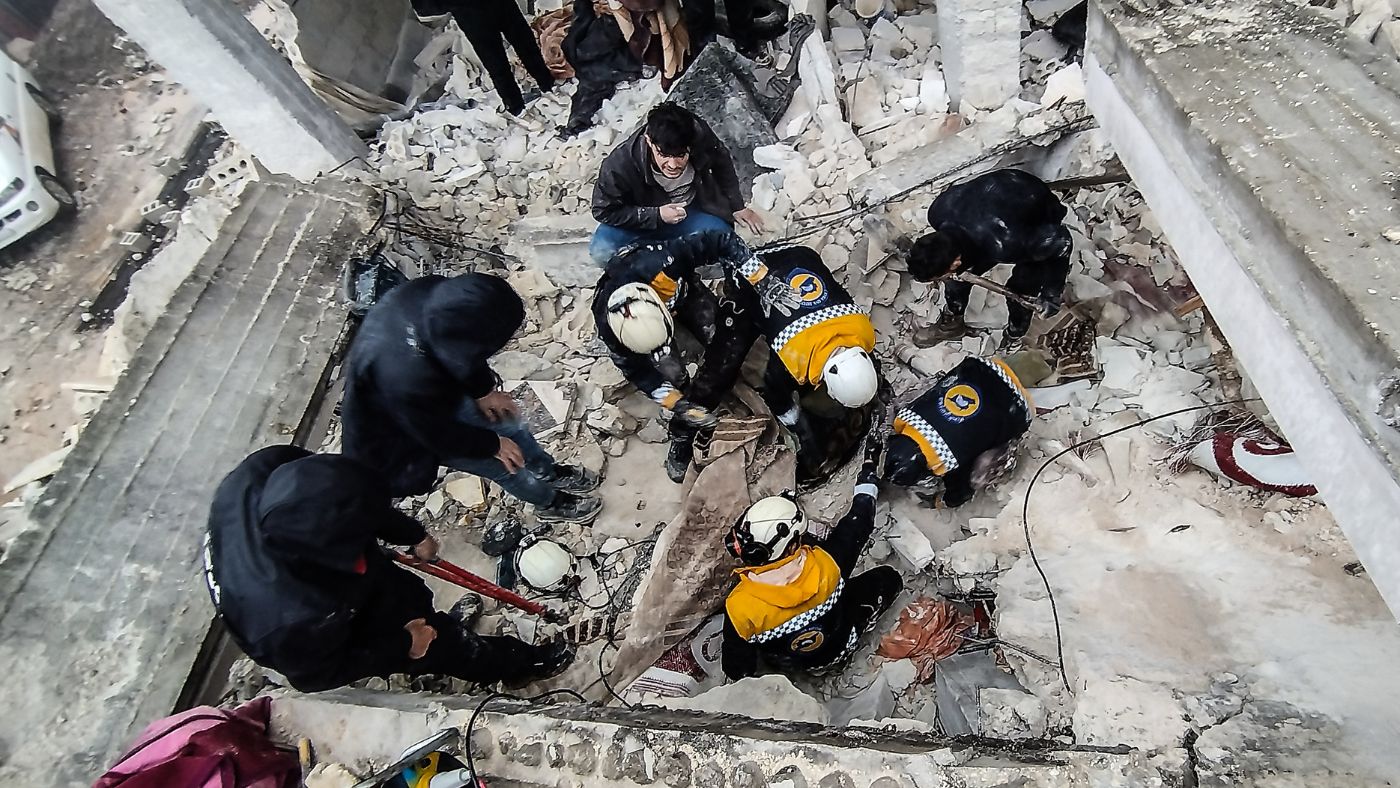Huge earthquake on Turkey-Syria border leaves thousands dead
Rescue teams in both countries are continuing to search for survivors after second quake hits

A free daily email with the biggest news stories of the day – and the best features from TheWeek.com
You are now subscribed
Your newsletter sign-up was successful
Almost 2,000 people have been killed and many thousands more injured by a 7.8-magnitude earthquake that struck Turkey and Syria in the early hours of Monday morning.
The confirmed death toll in Turkey stands at 1,121, the head of the country’s Disaster and Emergency Management Authority said, with over 5,000 more thought to be injured. The death toll in Syria is 783, according to the AFP news agency, “which has been combining figures from authorities in government-held areas with those from rescue group The White Helmets in rebel-held areas”, said the BBC.
The earthquake struck close to the southern Turkish city of Gaziantep at 4.17am local time, but “buildings collapsed in cities across the region, some of them hundreds of miles from the epicentre of the first quake”, The Times reported. Tremors were felt as far as Israel, Lebanon, Cyprus and Greece.
The Week
Escape your echo chamber. Get the facts behind the news, plus analysis from multiple perspectives.

Sign up for The Week's Free Newsletters
From our morning news briefing to a weekly Good News Newsletter, get the best of The Week delivered directly to your inbox.
From our morning news briefing to a weekly Good News Newsletter, get the best of The Week delivered directly to your inbox.
What happened?
Following the initial quake, a second powerful tremor of 7.5 magnitude hit at 1.30pm local time (10.30am GMT). The epicentre of the second earthquake was around 80 miles north of Gaziantep in the Elbistan district of Turkey’s Kahramanmaras province.
Officials said this was a separate earthquake itself, not an aftershock, although there have already been at least 40 subsequent tremors.
The first earthquake struck at a depth of about 17.9km (11 miles) about 20 miles from Gaziantep, which is home to about 2 million people, the US Geological Survey said. The region also hosts millions of Syrian refugees, and is the site of one of the largest operations run by the United Nations High Commissioner for Refugees.
The Turkish interior minister, Süleyman Soylu, said ten cities had been affected: Gaziantep, Kahramanmaraş, Hatay, Osmaniye, Adıyaman, Malatya, Şanlıurfa, Adana, Diyarbakır and Kilis.
A free daily email with the biggest news stories of the day – and the best features from TheWeek.com
In Syria, areas densely populated by refugees from the country’s civil war have been badly affected. In a statement, the White Helmets, the Western-funded civilian rescue service in the country, described “a catastrophic situation with buildings collapsed or suffering major cracks, hundreds injured and stranded, dozens dead and a lack of services as well as safe shelters and assembly points in stormy and snowy weather conditions and low temperatures”.
What has the response been?
Turkey’s emergency management agency, AFAD, has said it is deploying 1,898 search and rescue workers and 150 vehicles. The Gendarmerie Special Security Command has sent a crew of 130 with mobile command centres and kitchens to Kahramanmaras, according to The New York Times. A total of 300,000 blankets have also been sent to the region, which has been experiencing winter storms and where daytime temperatures are currently around 3C.
The airport in Gaziantep was on Monday morning only allowing planes carrying emergency aid to land, while all train services were suspended nationwide in Syria as the government declared a state of emergency.
In Syria, the White Helmets have called for aid from the international community “to prevent the situation from worsening”. It aims to pressure the Russian-backed Syrian government to hold back on airstrikes in the area, where buildings were particularly vulnerable due to previous conflict damage.
Experts have long warned that a large earthquake could devastate Istanbul, said The Guardian. Turkey, which lies over the Anatolian fault line, is in one of the world’s most active earthquake zones. A 7.4-magnitude earthquake in 1999 struck İzmit and the surrounding Kocaeli region, close to Istanbul, killing more than 17,000 people.
What happens next?
Although the number of dead and injured is continuing to climb, Turkey’s president Recep Tayyip Erdoğan said more than 2,400 people have been rescued from the rubble so far, reported The Washington Post.
Efforts to protect those living in the densely populated region from the cold, when some areas have lost access to gas or electricity, will be ongoing. There are more than 2.5 million people living within 50km (31 miles) of the earthquake’s epicentre, according to the World Food Programme’s Automated Disaster Analysis and Mapping system.
Erdoğan also said Turkey has received offers of assistance from 45 countries, alongside Nato and the European Union.
The United Kingdom stands “ready to help in whatever way we can”, Prime Minister Rishi Sunak said. He praised first responders in Turkey and Syria for “working so valiantly to save those trapped” under collapsed buildings.
Naci Görür, an earthquake expert with Turkey’s Academy of Sciences, has urged local officials to “immediately check the region’s dams for cracks to avert potentially catastrophic flooding”, added The Guardian.
Speaking to BBC Radio 5 Live, geophysics professor Martin Mai from the King Abdullah University in Saudi Arabia said there is currently “no way” to predict earthquakes. “There was in the scientific community a hope and effort in the 1970s and 80s to say earthquakes can be predicted, all these theories ideas did not hold,” he said, adding countries can only only “prepare” not “predict” or “prevent” earthquakes.